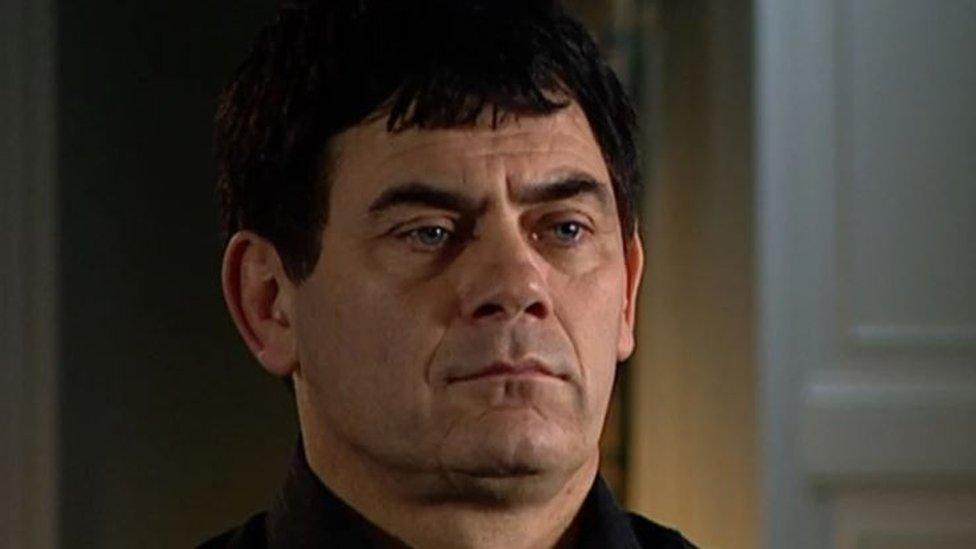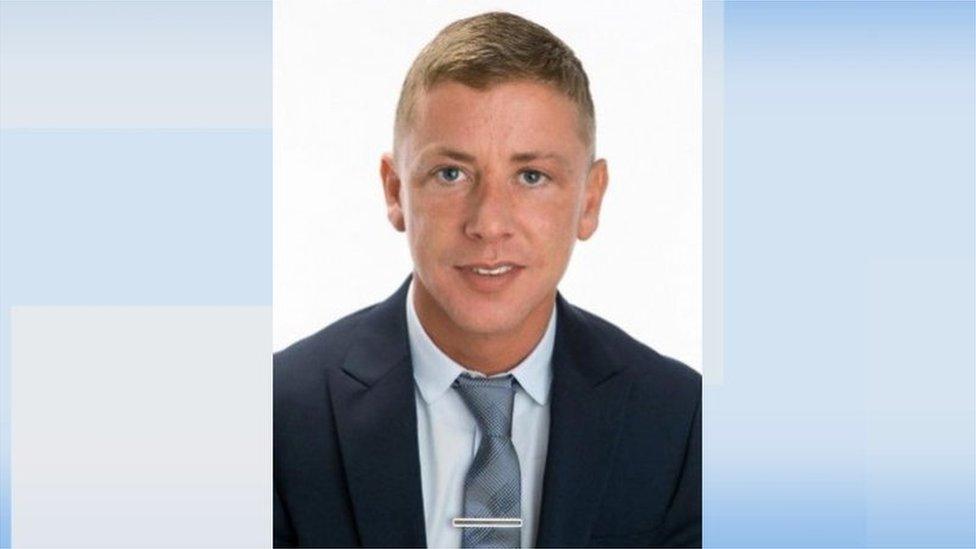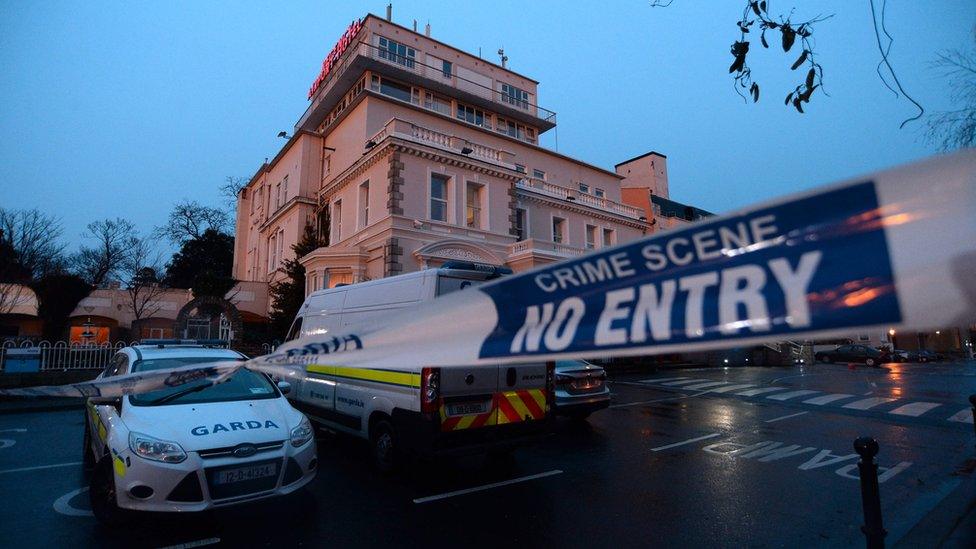Gerard Hutch trial: Tapes obtained under 'culture of secrecy', defence argues
- Published

Gerard Hutch, 59, has pleaded not guilty to the murder of David Byrne
Permission to deploy a garda bugging device that secretly recorded Gerard Hutch and Jonathan Dowdall talking was sought under "a culture of secrecy", a Dublin court has heard.
The court is to rule on the admissibility of the tapes played as evidence in Mr Hutch's murder trial.
The 59-year-old, from the Paddocks in Clontarf, has pleaded not guilty to the murder of David Byrne in Dublin during a 2016 boxing weigh-in.
The court has heard 10 hours of tapes.
Mr Hutch's lawyer has objected to their use because eight of the 10 hours were recorded in Northern Ireland when police bugged Dowdall's vehicle.
Mr Hutch and the former Sinn Féin councillor were driving to Strabane in County Tyrone when the recordings were made.
The Special Criminal Court was previously told the murder of David Byrne, 33, at the Regency Airport Hotel, was carried out execution-style as part of the Hutch-Kinahan gang feud.
Five men, three disguised as armed police in tactical clothing and carrying AK-47 assault rifles, carried out the attack.
The court has heard that Mr Hutch wanted to meet the Kinahans to arrange a ceasefire and have dissident republicans mediate.
On Friday, defence lawyers for Mr Hutch argued that the permission to deploy the garda (Irish police) bugging device was sought with "an unintentional lack of candour".
A barrister told the non-jury court that "on its face" there had been an illegal operation of the Criminal Justice Surveillance Act.

Jonathan Dowdall is a former Sinn Féin councillor
He said the prosecution was trying to "wheel the evidence in" which "extended beyond the territorial boundaries".
The defence argued that Dowdall's car was outside the Irish state in Northern Ireland from 15:10 GMT to 22:50 that day, when Dowdall allegedly drove the men to Northern Ireland to meet republicans.
'Complete information'
Garda Det Supt Eugene Lynch has given evidence of some of the records of the tracking device that had been on Dowdall's car on 7 March 2016.
He said the vehicle crossed the border at 15:12 and back into the Republic at 22.50 that night at Aughnacloy in County Monaghan.
The defence lawyer said the Criminal Justice Surveillance Act 2009 was confined to within the state.
He argued that a district court judge cannot grant authorisation for a surveillance device that could have affect outside the jurisdiction.
The barrister argued that a judge, who is asked to issue an authorisation for a bugging device, must be able to rely on "complete information" put before the court.
He said police were obliged to tell the judge that he had already approved the deployment of a tracker and logging device on Mr Dowdall's vehicle 36 hours earlier before asking him to deploy a third device on it.
'Certain culture of secrecy'
Counsel submitted that there had been a "very great failure to disclose information" in this case, which had created a "huge imbalance of information" between the applicant and the judge.
Retired Det Supt William Johnston, former head of the National Surveillance Unit (NSU), testified that he applied for authorisation to the court on 17 February 2016 to employ the audio device on Dowdall's car with a view to monitoring the conversations of Dowdall and his associates.
He told the defence lawyer that there was no reason why he did not tell the judge that he had already approved the deployment of a tracker and logging device before looking for the judge to authorise bug deployment.
Mr Hutch's defence argued that there had been "a certain culture of secrecy".

David Byrne was murdered during a boxing weigh-in at Dublin's Regency Hotel in 2016
He submitted that there had been "an unintentional lack of candour" as Mr Johnston had not alerted the judge about the tracker or that the vehicle may have been travelling outside the jurisdiction.
"Both matters may have provoked an inquiry from the judge as to whether or not he would see how the tracker worked first," he said.
He outlined that a duty of candour involves "not just what is not said but what is said that misleads".
Mr Hutch's defence submitted that the evidence from the NSU members demonstrated the extreme care that gardai take in terms of their personal onus and they had made "crystal clear" to the court that they cannot operate in Northern Ireland.
The prosecution will respond to the defence's arguments on Monday before judges rule on the admissibility issue.
Mary Lou McDonald
Earlier this week, the court heard Mr Hutch and Dowdall met men in a lane in Strabane.
In the recordings, Dowdall told Mr Hutch that they had met "northern command", then a man with a northern accent is heard to tell Mr Hutch there was "no grey area, they're looking after you they're looking after your family".
The pair also talked about Sinn Féin and its president, Mary Lou McDonald.
Former Sinn Féin councillor Dowdall said the party would be stupid not to go into coalition government, with Mr Hutch saying it should do what is in the best interests of the country and not the party.
Dowdall then criticised Mrs McDonald for not attending the funeral of Mr Hutch's brother, Edward.
He was killed days after the shooting at the Regency Hotel.
Dowdall said she should have attended the funeral and that she stayed away from it on purpose.
"She didn't attend the innocent man's funeral. She was on the telly the night Neddy got shot and she branded everyone as scumbags, she said they're all scumbags," he said.
"She shoulda turned around and said, I know that deceased man and I know that family. It'd be different Gerard if she was a politician and it was not her area. You's are in her area and she shoulda said that," he said.
"But ya's were good enough to use Gerard for votes, ya's were good enough to use for money".
Mr Hutch replied there wasn't "one of them at" the funeral.
There are also discussion about "yokes", which the prosecution believe referenced the assault rifles used in the shooting of David Byrne.
Mr Hutch is heard telling Dowdall he wants "them three yokes outta here".
On Thursday, the court head Mr Hutch say the Kinahans wanted "to be the biggest gang in Europe".
The court also heard that Mr Hutch agreed with Dowdall when asked if he would be happy "with just a few quid under the radar", with the accused adding that he doesn't want "hundreds of millions".
Dowdall, 44, of Navan Road, Dublin, was due to stand trial for Mr Byrne's murder alongside Mr Hutch.
However, he pleaded guilty in advance of the trial to a lesser charge of facilitating the Hutch gang by making a hotel room available ahead of the murder.
He was jailed by the Special Criminal Court for four years.
The former councillor is currently being assessed for the Witness Protection Program after agreeing to testify against Mr Hutch.
Mr Hutch's two co-accused, Paul Murphy, 61, of Cherry Avenue, Swords, County Dublin, and Jason Bonney, 50, of Drumnigh Wood, Portmarnock, Dublin, pleaded not guilty to participating in or contributing to the murder of David Byrne by providing access to motor vehicles on 5 February 2016.
The trial continues.